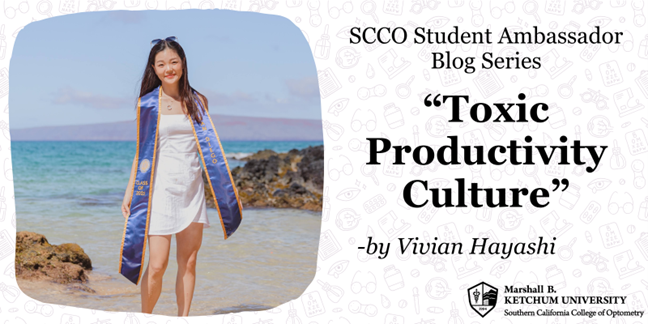“I pulled another all-nighter yesterday to prepare for this exam.”
“I had to down 3 Red Bulls just to finish this essay.”
“I haven’t eaten anything today because I was too busy studying.”
“I only got 5 hours of sleep last night.” “Lucky, I only got 3.”
Do any of these comments sound familiar? Maybe you’ve overheard a conversation in the library or in the hallway before class starts. Many of us have become desensitized to these kinds of statements and the harmful underlying message they evoke.
Toxic productivity culture is a phenomenon that occurs when you push your body and mind to unhealthy extremes in the name of productivity, often at the expense of your physical and mental health. Many students feed into this mindset, even competing to see who has sacrificed more.
I, too, was one of those students. I forfeited my wellbeing to do well in school and the consequences that followed were taxing. In my undergraduate career, I tried so hard to keep up with my peers. I thought that pulling all-nighters meant you were a dedicated student or that drinking 3 iced coffees a day meant you were at peak performance. I felt a sort of superiority over others who were in bed by 1AM or left the library after only 2 hours of studying. But soon I realized, by staying up later and consuming more caffeine, I wasn’t really getting more done. In fact, I was falling behind: I was constantly fatigued, dehydrated, and unhappy. I was in and out of the student health building for migraines and stomach cramps. At one point, I even caught a cold that lasted for 3 months. When I came home for breaks, I could barely interact with my family and spent most of the time sleeping, trying to pay off all the accumulated sleep debt. All this because I chose to prioritize my grades over my health.
The following things helped me overcome this toxic mindset:
- Shift your priorities. Try not to place any value on having an unhealthy lifestyle. Understand that your lifestyle is what gives you the energy and mental capacity to be productive. Try your best but know when to call it a day. If you feel tired, take a nap. If you feel hungry, eat a snack. If you feel stressed, take a walk outside. Don’t get caught up in the competitive nature of toxic study culture. Just because your peers can function on 4 hours of sleep or on 1 meal a day does not mean that you must. Everyone has different needs to perform at their best. Listen to your body!
- Take breaks. By implementing study techniques like the Pomodoro method, you can insert little breaks throughout the day. Additionally, I try to clear my Sundays for a true break, where I allow myself to do nothing and accomplish nothing, to recharge and feel refreshed for the next week ahead. Whether I hang out with friends or stay in bed the whole day, I always carve out this time for myself. You might feel guilty in the beginning for allowing yourself this relaxation period, but it is so rewarding and prevents burnout in the long run.
- Build a support system. Find a group of people you trust that you can lean on when times get rough. Your friends and family can provide emotional support during stressful periods. Form study groups, hold your peers accountable, lend a helping hand when you can, and ask for help when you need it. We’re all in this together.
- You are not your grades. If you know you’ve tried your best, you can be proud of your results, no matter what they are! Having a healthy body and a healthy mind will carry you farther than your GPA ever could!
SCCO is the perfect place to begin this mindful shift in perspective. Since my interview day, I’ve felt an overwhelming sense of camaraderie and teamwork from not only the student body, but also the faculty and staff. We are encouraged to have fun, work together, and take care of ourselves and each other. There are so many helpful resources provided by Enrollment and Student Services at MBKU that are available to all students: from counseling to therapy puppies that allow us the chance to take a breather during the hectic curriculum.
Take care of yourself. You deserve it.
Click here to read Student Ambassador bios on our website!

